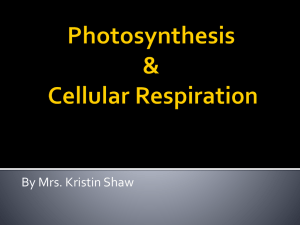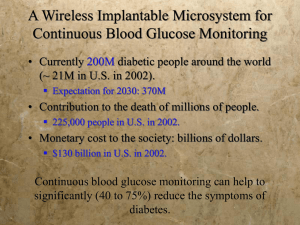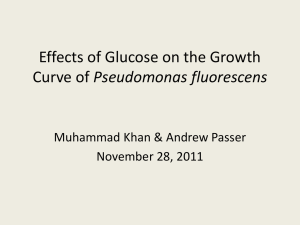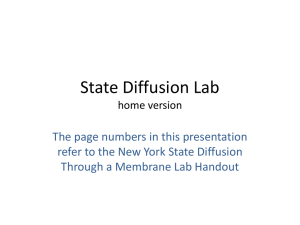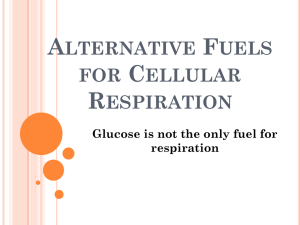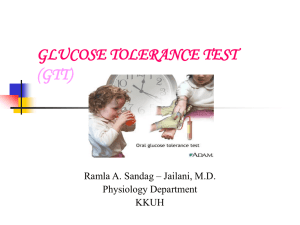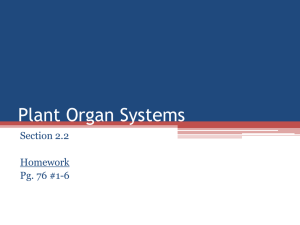Reverse Iontophoresis - Faculty Server Contact
advertisement
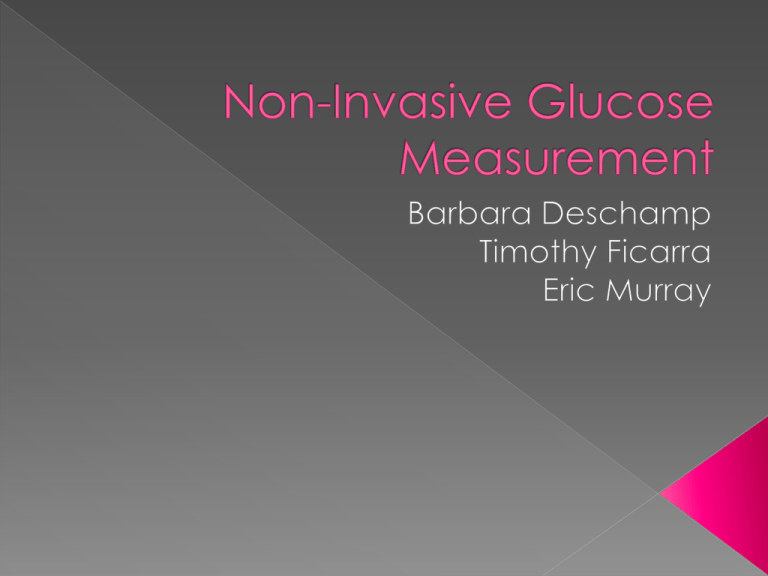
Eric › VeraLight Scout DS › LighTouch Glucose Monitor › OrSense NBM-200G Barbara › GlucoScope › GlucoView Tim › GlucoWatch › EZ Scan › Symphony tCGM Study of the interaction of matter and light Light is focused on some area of the body Light is absorbed and reflected in different ways Subcategories include near-infrared, midinfrared, and photoacoustic spectroscopy. Detect the presence of glucose by observing the reflectance of light against Scout DS Consists of a light source, an optical detector, and spectrometer, all located on an arm-rest. Uses spectroscopy to measure advanced glycation end products (AGE) Glycation occurs when a protein or lipid is bonded with glucose. Hyperglycemia from diabetes results in higher cellular glucose levels. This leads to increased glycation, and increased levels of AGE formation. Product is only useful for predicting the development of Type 2 diabetes. May eventually replace the current invasive diabetes screening methods. LighTouch Glucose Monitor 12 issued patents, more pending. Projects a specific wavelength of light onto fingertip and detects the wavelength of reflected light. Designed for daily testing and accuracy equal to finger-stick method. Clinical trials began in 1999 with Joslin Diabetes Center, Syracuse, New York. Monitor has been continually redesigned Improvements have been made in speed, accuracy, cost, and form-factor. Currently in the process of getting FTA approval. Plans on releasing home version six to nine months after approval. Potential to replace traditional method. Plans to use their technology for other blood analyte measurement devices. NBM-200G Glucose Monitor Specific version of their NBM-200MP which measures hemoglobin, oximetry, and pulse rate. Based on proprietary Occlusion spectroscopy technology. Sensor wraps around finger, applying pressure. The change in blood dynamics is used in allowing a strong optical response. 51 patents worldwide, more than 20 pending. Developed the concept of measuring analytes through occlusion of blood flow, a unique finger sensor, and algorithms to facilitate the OrSense NBM-200MP OrSense NBM-200G Image Source: http://www.orsense.com NBM-200G currently undergoing clinical trials. Tested on over 450 subjects over a 24-hour period “At this stage the NBM200G glucose monitor is utilized for investigation and market awareness purpose only” Image Source: http://www.orsense.com/?id=815 Eric › VeraLight Scout DS › LighTouch Glucose Monitor › OrSense NBM-200G Barbara › GlucoScope › GlucoView Tim › GlucoWatch › EZ Scan › Symphony tCGM Produced by Visual Pathways Inc Received federal grant in 2003 under the U.S Department of the Army Medical Research Acquistion Activity Received a patent December 2004 Measures the glucose levels in the fluid of the anterior chamber of the eye A vision care diagnostic company Headquarters in Prescott, Arizona Developed a prototype in 2003 GlucoScope Monitor uses infrared light to rapidly measure glucose levels in the eye The handheld device looks like a small pair of binoculars https://www.diabetesnet.com/diabetes-technology/meters-monitors/future-metersmonitors/visual-pathways The cornea and a lens form the anterior chamber The anterior is also comprised of the iris and the aqueous humor Glucose concentration in the bloodstream is directly correlated to the concentration in the aqueous humor Variation in the glucose concentration will cause variations in its index of refraction The refractive index can be measured by interferometry Two beams are directed into the eye and caused to interfere The interference produces a fringe pattern (bright and dark lines) The pattern is analyzed and the index of refraction of the eye is determined The glucose concentrations is then determined The glucose level in the blood can be determined from this information Handheld Portable Digital readout Still in the research and development phase Not commercially available Produced by Sentek Group Inc Licensed from the University of Pittsburg Disposable contact lens which changes color according to glucose levels in tears Uses a Crystalline Colloidal Array Technology A red shift indicates hyperglycemia A purple shift indicates hypoglycemia When the CCA is polymerized within a hydrogel PCCA , the PCCA optically reports volume changes experienced by the hydrogel This is because the observed diffraction wavelength is directly related to the spacing between lattice planes The CCAs are brightly colored because they diffract visible light due to Bragg’s diffraction › › › › › nλ = 2dsinθ where, n is an integer λ = wavelength of the incident wave d is the spacing Bragg diffraction depends on the refractive index of the system and the spacing between the diffracting planes It is non-invasive (no finger pricks) It requires no instrumentation( to collect fluids or to analyze results) Provides easily measurable, quantitative results It is low-cost Continuous monitoring Helpful for caretakers of children and elderly Necessary to wear contact lenses (most diabetics have vision problems) Does not collect data for future analysis Eric › VeraLight Scout DS › LighTouch Glucose Monitor › OrSense NBM-200G Barbara › GlucoScope › GlucoView Tim › GlucoWatch › EZ Scan › Symphony tCGM Technique for extracting subdermal molecules › Apply DC current to the skin › Current attracts charged molecules › Force of the flow also draws neutral molecules Glucose and lactate are among the molecules which can be extracted First commercially available non-invasive glucose measurement technique › Continuous monitoring › Requires blood test for calibration › Suffers inaccuracy in detecting hypoglycemia Discontinued by Animas Corporation in 2007 Tool for blood sugar testing › Two minute test › Utilizes five sensors In regions rich with sweat glands 2 hands, 2 feet, 1 forehead Requires no calibration Still in developmental stages Transdermal Continuous glucose monitoring › Real time › Biosensor broadcasts wirelessly to a monitoring tool › No calibration Uses a proprietary skin permeation device Prelude › Improves effectiveness of reverse iontophoresis Image source: www.echotx.com Improves permeability of skin for reverse iontophoresis Tool removes the outmost layer of epidermis (stratum corneum) › Uses feedback control algorithm to prevent damage › .01mm in thickness comprised of dead skin Image source: www.echotx.com Spectroscopy and Reverse Iontophoresis › Viable solutions for Non-Invasive Glucose Measurement Symphony tCGM is one of the most viable candidates › Barbara maintains that the GlucoView will ultimately win
